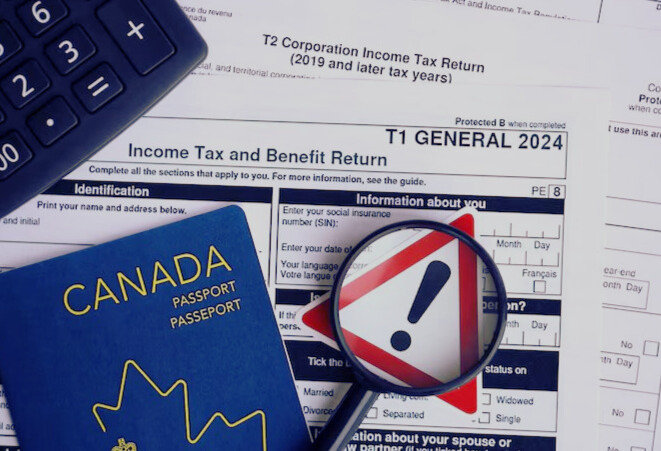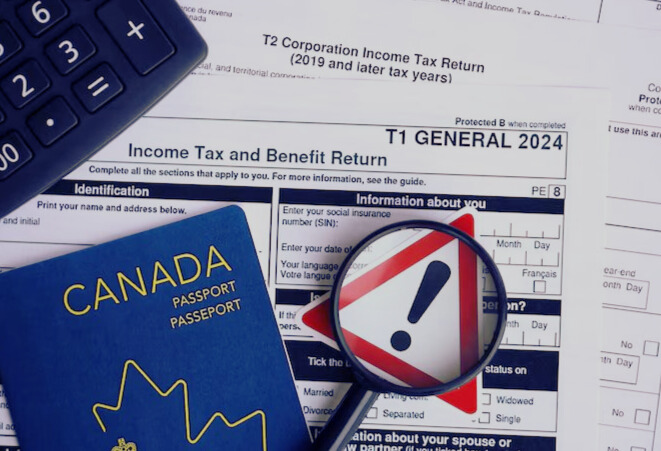Filing your taxes accurately and on time is an essential part of financial responsibility in Canada. Each year, the Canada Revenue Agency (CRA) sets specific deadlines for filing individual and business tax returns. Missing these deadlines can lead to penalties, interest charges, and unnecessary stress. As we enter the 2025 tax season, it’s crucial to stay informed about the key dates and requirements that apply to your situation.
Whether you’re an employee, self-employed, or a new immigrant, understanding the Canada tax filing deadlines in 2025 can help you avoid common mistakes and ensure a smooth tax process. This guide outlines everything you need to know to prepare for tax season effectively.

Why Tax Filing Deadlines Matter
Meeting tax deadlines is more than just a formality. The CRA applies interest and penalties on outstanding balances if tax returns are filed late or not filed at all. Missing deadlines may also delay refunds or benefit payments, such as the GST/HST credit or Canada Child Benefit.
Filing your tax return on time allows the government to process your information promptly and helps you maintain eligibility for various income-based programs.
Key Canada Tax Filing Deadlines in 2025
Here are the important dates all Canadians should keep in mind for the 2025 tax year:
1. April 30, 2025 – Deadline for Most Individual Returns
For most individuals, the deadline to file your 2024 personal income tax return is April 30, 2025. If you owe taxes, your payment is also due by this date. Filing after this deadline may result in a late-filing penalty and daily interest on any unpaid balance.
2. June 15, 2025 – Deadline for Self-Employed Individuals
If you or your spouse/common-law partner is self-employed, you have until June 15, 2025, to file your tax return. However, if you owe taxes, the payment is still due by April 30, 2025. It’s important to plan accordingly and ensure any balance owing is paid by the earlier deadline to avoid interest charges.
3. February 28, 2025 – T4 and T5 Slips Issued by Employers and Financial Institutions
Employers and institutions must issue T4, T5, and other relevant slips to taxpayers and the CRA by February 28, 2025. These documents contain information about your income and deductions and are essential for preparing your return accurately.
4. March 1, 2025 – RRSP Contribution Deadline
To claim deductions for Registered Retirement Savings Plan (RRSP) contributions on your 2024 return, you must make all contributions by March 1, 2025. Contributions made after this date can only be claimed in future tax years.
5. January 1 to December 31, 2024 – Tax Year for Most Individuals
The majority of individuals in Canada follow the calendar year for income tax purposes. This means you must report income earned and claim eligible expenses from January 1 to December 31, 2024 on your 2025 return.
What Happens If You Miss a Tax Filing Deadline?
Failing to file your tax return on time can have financial consequences. The CRA charges a late-filing penalty of 5% of your balance owing, plus an additional 1% for each full month your return is late, up to a maximum of 12 months. Interest is also charged on any unpaid taxes, compounded daily.
If you have a history of filing late, these penalties can increase. In some cases, the CRA may even withhold benefit payments until your return is submitted.
Tips for Meeting Tax Deadlines in 2025
1. Stay Organized Throughout the Year
Keep digital or physical copies of tax documents, including pay stubs, receipts, investment records, and charitable donation slips. Having everything in one place will make tax preparation faster and less stressful.
2. Use a CRA My Account
Register for the CRA’s online portal to access your tax slips, notices of assessment, benefit information, and RRSP contribution limits. You can also track your refund and receive important reminders.
3. Set Reminders for Key Dates
Mark deadlines in your calendar or use mobile reminders to stay aware of upcoming due dates. Don’t rely on last-minute preparation—start early to avoid errors.
4. File Online for Faster Processing
Filing online through certified software helps speed up processing. It also reduces the chances of making common mistakes and allows you to receive your refund faster through direct deposit.
5. Seek Professional Help if Needed
If your tax situation is complex—such as self-employment, foreign income, or multiple investments—consider hiring a tax professional. Timely advice can help you meet deadlines and avoid overpaying or underreporting.
Special Considerations for 2025
1. New Canadians and First-Time Filers
If you moved to Canada in 2024 and are filing your first return, the same deadlines apply. You’ll need your immigration documents, SIN, and all income earned in Canada. Filing on time ensures you are considered for benefits like the GST/HST credit.
2. COVID-Related Adjustments
While there were temporary deadline extensions during the pandemic, it’s important to follow the standard CRA deadlines in 2025 unless an official update is announced. Always check the CRA website for any changes.
3. Electronic Notices
The CRA has moved toward electronic communication. Be sure to check your online CRA account regularly for assessments, deadlines, and reminders.


This comprehensive guide on Canada Tax Filing Deadlines for 205 provides essential information, ensuring readers do not face penalties due to late filing. It’s a must-read if you plan your tax strategy around the upcoming new deadlines.














